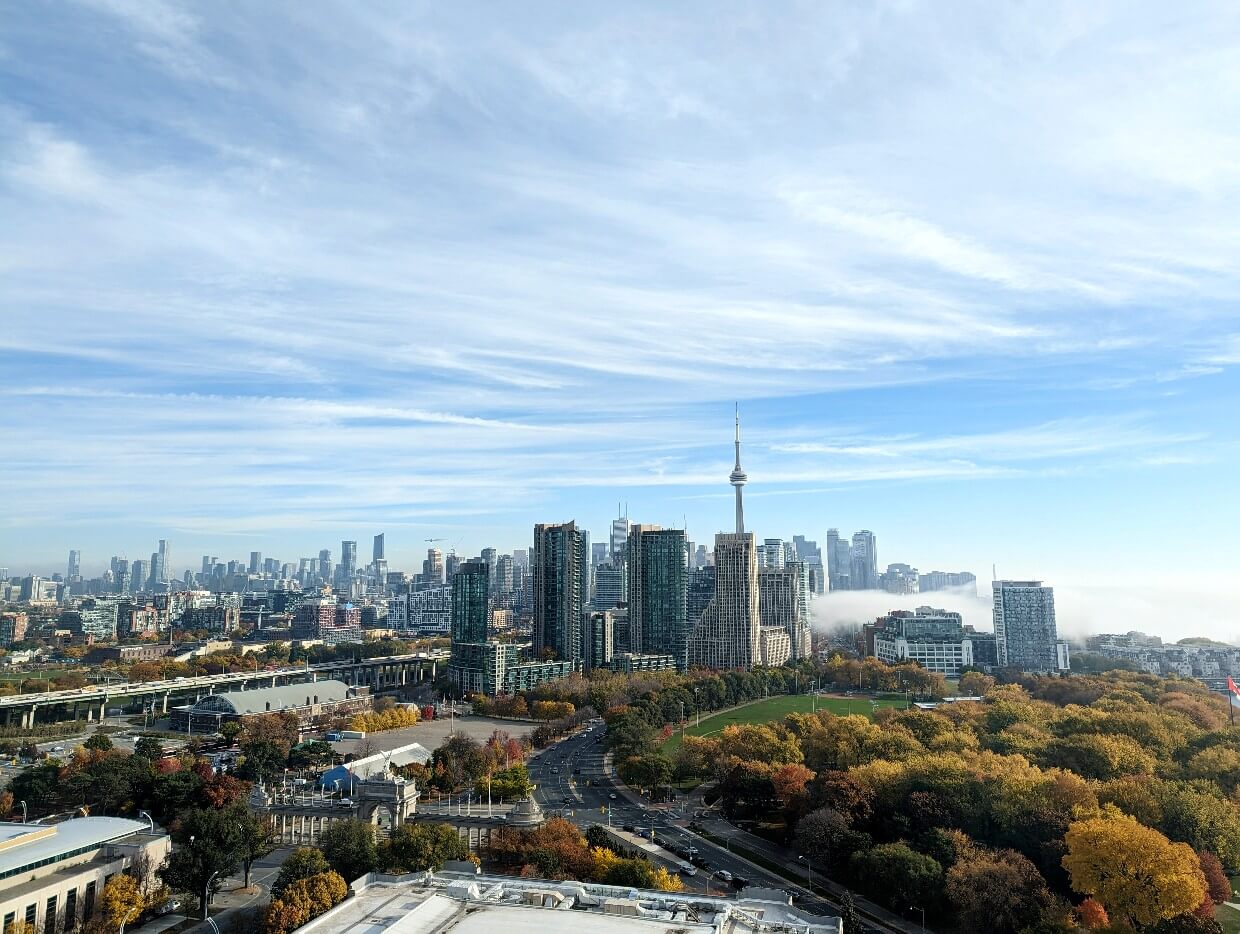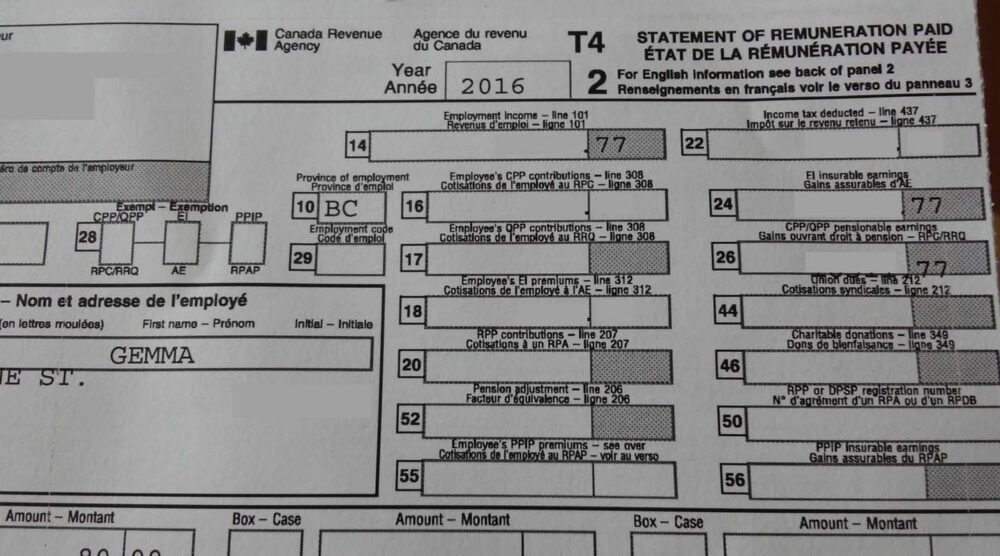It’s not the most exciting or interesting part of your working holiday in Canada but taxes still need to be done!
Filing your taxes after a working holiday in Canada can also be quite beneficial, in the form of a tax refund if you have overpaid tax.
If you’re like me and used to the government in your home country automatically calculating tax (and refunds), the idea of filing your own taxes can be a bit intimidating.
Since moving to Canada we’ve had to file our taxes a couple of times now and I can assure you that it’s not as complicated as it sounds, especially as there are a few options that can make the process easier.
There are some affiliate links included in this post. If you make a qualifying purchase through one of these links, I may receive a small percentage at no extra cost to you.

Canadian tax return basics
The Canadian tax year runs from January to December.
Though you may have noticed tax being deducted from your payslip already, you need to file your own taxes after the end of the tax year to make sure that the correct amount of tax has been paid.
Tax season usually starts in February for the preceding year i.e. tax returns for 2024 can be filed starting February 2025.
The deadline for filing taxes is usually at the end of April. In 2025, the deadline is 30th April.
If you haven’t filed by the deadline but do not owe any taxes, then it is no issue.
If you do however owe any taxes in addition to what you have already paid, then there will be a penalty to pay.
Whether you are eligible for a refund or not depends on a variety of factors. Keep in mind though that you will never get 100% of the tax you have paid back.
A certain amount of tax, as well as E.I (Employment Insurance) and CPP (Canadian Pension Plan) must still be deducted from your income, even if you’re in Canada on a working holiday.
Canadian tax return: T4 details
A T4 is an information slip prepared by employers to summarise how much money you earned and how much income tax was deducted.
To be able to file taxes in Canada, you will need a T4 from every employer you have worked for during that tax year.
At the end of the tax year, any employer you have worked for during that year will provide you with a T4 by the end of February. They are legally obligated to do so.
Some of my employers have provided this by email, while others still prefer good old snail mail. If you leave Canada mid-way through a tax year, you will still have to wait until the end of the year to receive your T4.
You cannot file your taxes without your T4(s). It is possible to apply for a refund not only on your income tax but also on certain other expenses such as medical or work-related costs.

Working out your residency status
When filing your taxes in Canada, you will need to know your tax residency status. Whether you are considered a resident or non-resident of Canada for tax purposes entirely depends on your individual situation.
There are no hard and fast rules whether a working holiday participant is a resident or non-resident, it is based on your individual situation.
There are so many unique scenarios that make it difficult to definitively state whether you are a resident or non-resident.
I have written a separate article all about determining your tax residency status that may help (link below) but otherwise, I’d highly recommend consulting either the CRA, an accountant or a professional tax filing company.
How to file your taxes on a working holiday in Canada
Once you have your T4(s) ready, you will also need to grab your Social Insurance Number (SIN) and then work out the method you want to use to file your tax return in Canada.
The general difference is the cost and amount of effort involved. Everyone approaches their taxes differently:
- If you like control and/or are on a budget, consider completing the process yourself
- If paying someone else $50-100 to deal with your tax return sounds good, think about using a tax filing service

1. Complete the process yourself by mail (cheapest, most effort)
This method is free, except for postage. You can download, print, complete and send the tax forms directly to the CRA (Canada Revenue Agency).
Packages of forms are also available from Service Canada offices and Canada Post.
If you decide to use this method, you will need to read up and decide whether to apply as a resident or non-resident.
2. Use tax software to help complete the forms (cheap, less effort required)
You can also buy or download easy-to-use tax return software to enter your information into. The program will complete the calculations for you and generally make the process more simple.
- If filing as a resident or non-resident of Canada and it is your first ever tax return in Canada, then you have to do is print off the forms and send them to the CRA in the mail
- If you are filing as a resident of Canada and it is not your first return, you should be able to send your return directly to the CRA online via the Netfile service
Note that the free or low-cost tax filing software is often limited to just one return (so you can’t share the program around) and one T4.
So if you have more than one T4, be sure check the limitations of the program before purchasing or downloading.
3. Use a tax filing service for the whole process (most expensive, easiest)
Tax filing companies will effectively do everything for you from start to finish. It is estimated that over half of Canadians choose a company to file their taxes for them. This tax filing method is usually the most expensive ($100+).
Be aware that not every tax preparation company will have lots of experience processing tax returns from people on working holidays.
Some companies may even tell you that they do not do returns for non-Citizens/Permanent Residents.
The most straightforward and hassle-free option is to use an international tax filing service. One of the most popular, taxback.com, has recently stopped accepting Canadian returns (final date 1st July 2025).
Filing taxes outside of Canada, after your working holiday?
If you’re filing outside of Canada, then you have only two real options for filing your taxes.
The first (slower) is to download the forms from the CRA website, complete and then mail them to the CRA in Canada.
If you’re due a refund, CRA will send you a cheque in Canadian dollars to your international address.
Be aware that your bank may charge a fee to process a foreign cheque or may not accept foreign cheques at all.
The other (faster) is to use an international tax filing service such as Taxback.com, as mentioned above. They send tax refunds via bank transfer.
Found this post helpful? Subscribe to our IEC newsletter!
Working holiday advice and updates delivered straight to your inbox, with a FREE printable IEC packing list
Check out these other posts about working holidays in Canada

One half of the Canadian/British couple behind Off Track Travel, Gemma is happiest when hiking on the trail or planning the next big travel adventure. JR and Gemma are currently based in the beautiful Okanagan Valley, British Columbia, Canada. Consider buying us a coffee if you have find any of our guides helpful!




Has anyone had any experience of trying to get your CPP payments back once you leave to go home?
Thanks!
Hi Emily,
I’ve never heard of any IEC participants managing to get CPP payments back. As far as I understand it, you are eligible to get them back when you hit retirement age in your home country i.e. a long time away!
Hi Emily and Gemma,
Just an FYI I got CPP refunded to me a few months after left canada. MPP sent me out a termination selection statement which I completed and then they posted me out a cheque. It was really easy actually.
Gemma, do you know if we send the tax return to “non- resident individual” address on the website or just the tax centre for you province?
I am also going to send in form rc325 to change my address back to the Uk, will they then send the refund to the new address on the form rather than my stated mailing address in canada.
thanks in advance for any info
Hi Catherine,
How did you get your CPCP refunded? I have never heard of anyone being able to do that.
All the address details for tax returns can be found here http://www.cra-arc.gc.ca/cntct/t1ddr-eng.html
I’m not sure about your second question, sorry!
Hello
I am leaving Canada after working here for 3 years on a working visa. Can I apply to get a refund on my CPP? Thanks
Hi Barry,
As far as I understand, you can only claim back CPP after you become eligible for retirement in your home country. I’ve never heard of anyone being able to claim it back after leaving the country, as you do in Australia.
Hi Gemma,
I find your site really useful but I still have some concerns about tax refund.
Currently I am in Canada on working holiday visa but I am going home within a month and would like to have more information.
It’s going to be 9 months that I have spent in Canada and I wanna know how can I get tax refund from my home country.
If I understood well I can use taxback.com, but I am curious how I can get my T4 if I am not residing anymore in Canada? And can I get my check to my home address or on my banking account which is not canadian?
In adition, I’ve heard that I have to sign the tax form and send it by post, but this won’t be possible since I wont be in Canada anymore. My question is if this is really possible to do from a distance?
You can see I am confused about those thing so I would appreciate your response and any information would be very helpful. Hope you understood me.
Thanks in advance,
Marko J.
Hi Marko,
In regards to your T4, speak to your employer before you leave and ask how they usually send T4s to staff. I’ve had T4s sent by email as well as mail before. If it is the latter, you can ask if they can send it to an address in your home country i.e. family/friends etc. It is best to organise this before you leave as otherwise it is likely that your T4 will be sent to your last known address in Canada.
Sending the forms by international mail isn’t a problem. It is definitely possible to do it from a distance 🙂
Hello Gemma,
I worked and travelled for one year in Canada and
I am also stuck at the question:
am I am “deemed non-resident for tax purposes” or “deemed resident for tax purposes”.
or must I select “deemed non-resident for tax purposes” because I am on a working holiday visa?
or may I be able to select “deemed resident for tax purposes” as I have spent more than 183 days in Canada in the tax year in question and I also had significant residential ties: I had a Canadian bank account, I had health insurance.
But I am filing for the tax year 2014. I am now back in the UK. Does that change anything.
I am also still missing T4’s … do you think my past employers are still able to e-mail the T4’s, 2 years after?
If I do use the services of taxback.com – do they cost a lot – as I have only worked 6 months out of 6?
Thank you so much for all your answers,
Daniela
Hey Gemma,
Your website is really helpful. I would just like to know if claiming tax back when outside of Canada, how do you get the money back in your home currency?
Also would I be a resident or non-resident.
Thanks,
Sam
Hi Gemma
I am trying to determine if I am a resident or non resident for tax purposes, and whether I am eligible for the schedule 6 reduction. Would you be able to provide any information that may help?
Thanks.
My girlfriend is from France, on a working holiday visa since July 2015 and working since october 2015 inclusive until next year… can you send me any information?
Hey all, just finished 2 year’s on IEC visa. Did both my years tax with simpletax.ca really easy and all online as we are now able to use netfile and can set up direct debit for first timers now too (just ring CRA to set up). They do all provs but Quebec. It’s free, they ask for donations but it’s up to you what you want to give. I have heard from CRA that there is apparently a way to get CPP back early but you need to file for it the year after you file you last return so you have no outstanding tax to sort. Yet to try it yet as I’ll have to wait for 2016. Hope this helps 😉
Hi Glen…did you declrare deemed resident, non resident or deemed non resident ? was it different for each year reported?
Hi.
Could you email me some info for tax deductions. Thank you
Hi guys, I left Canada last year after doing a working holiday visa and I’m preparing my 2015 return now… I’m wondering is there an extra form for adding payment info not in Canada? The CRA have my Canadian bank account details on file from my 2014 return but the account is now closed so I’m not sure how to tell them this? Has anyone else received a refund to their home address / bank account after leaving Canada? Thanks!
Hi Gemma,
I am an Australian living in Canada, this year was my first tax return. I posted it into the CRA at the end of April and have still not had my refund or even heard anything back. Does it usually take this long? Is there a way I can find out what stage it is at? I phoned the CRA and they cannot see anything on my file yet so they cant tell me anything.
Thanks!
Hi Brendan,
That seems a long time – in my experience it has been much less than that but I also filed my taxes early. I hope you hear something soon
Hello Gemma, I’d love to get the email everyone is requesting 🙂 I have just started contemplating how I will do the tax return when the time comes so your post has been very helpful. One thing I haven’t successfully resolved is how I will receive the potential tax refund. I guess I will have to leave my bank account open beyond my stay in Canada and then close it when the WHV is done. If you have any suggestions about what else is possible in terms of refunds, I’d love to get your input. Thanks again for your help!
Hi Gemma,
Your website has been very helpful! I was also wondering if you could possibly email me some info. I am also in a similar situation to Michael and Lauren where I am under a Youth Mobility Visa in the UK, but have a couple secondary residential ties to Canada. However, I have not been in Canada for 183 days. Thanks!
Hey,
I am here on a Working holiday visa and I wanted to know if you had to pay CPP? I’ve only been here for four months. I am self employed here and working as a contractor. Is it enough if i save around 25% of my earnings?
Thanks,
Sarah
Hi Gemma,
Can you send me some information. I am no longer living in Canada but need to file my 2016 taxes. I moved bank to Ireland in April, I still have a Canadian bank account and address that I can use. Do I file as a resident or must I file as a non resident, would this make a diferance to my returns owing?
Hi Avril,
Yes, filing as a non-resident or resident would generally make a difference to whether you owe money (and how much) or have a return owning. Whether you file as a non-resident or resident entirely depends on your situation and interpretation of the definitions – consider contacting CRA for advice.
Hi,
I am about 1 year into my 2 year IEC working holiday. I worked at a kitchen and a retail store during my first 6 months here but I have since gone fulltime freelance working remotely. I have been setting aside 30% of each payment I receive for tax purposes and am planning to have an accountant do my taxes come tax time. Is this all I need to do to be compliant with IEC visa & Canadian tax regulations? Are there any rules or requirements for freelancers as far as IEC visa’s go?
Thanks in advance!
Hi Scott,
Depending on where you live, you may need to register your business with the local city or municipality. You’ll also need to register for GST once you have earned over $30,000 in the tax year.